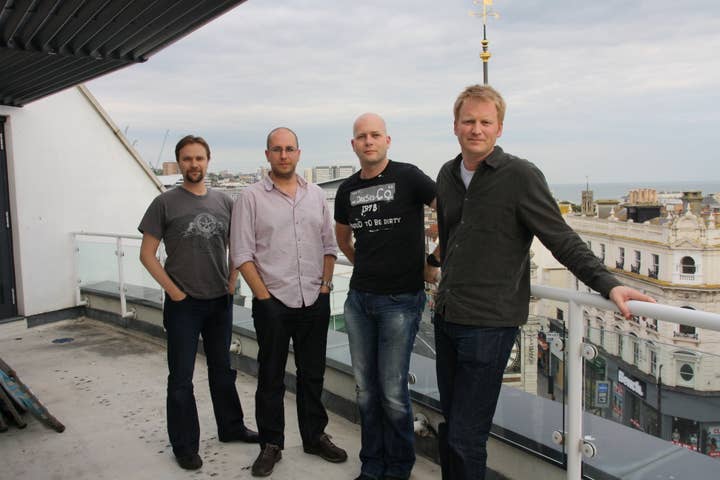UK development: Where next?
Thomas Bidaux, Paul Mottram, Nick Baynes and David Amor discuss Brighton, Britain and the boxed business
As part of our continuing focus on the Brighton industry community in preparation for Develop this week, GamesIndustry.biz conducted a roundtable discussion on issues currently affecting the city and the nation's industry.
Featured are Relentless co-founder David Amor, Nick Baynes, ex-Black Rock game director and co-founder of new start-up RoundCube, Zoe Mode's studio head Paul Mottram and ICO Partners CEO Thomas Bidaux. Read on for their views on where to look for opportunity, profit and success, improving the quality of life for developers and empowering staff.
Yes, although not necessarily boxes. I think everyone would agree, even the biggest advocates of boxes, that they're dying. The main thing with us is that we don't want to jump and say, that's it, boxes are dead, big teams are dead, we're just going to work on two or three man projects. I don't think we'll do that.
We want to remain working in a space which has technology which is exciting to us. The interesting thing is, for a lot of developers - THQ just closed its studio in the north - it seems that a lot of the start-ups that come out of these collapses immediately say, "okay we've had it with the big projects, we're going to work on the smaller things."
But, the interesting thing is, whilst the technology that's there on tablets, browsers, what have you, is somewhat behind what AAA console is, that stream is coming in our direction. I think it would be a shame for any AAA console developers to throw that away and aim for a target down there when the target's moving towards them.
My world has got a lot wider because I'm trying to make games for a lot of other people other than just gamers
David Amor, Relentless
It works differently for different people, but as far as we're concerned we want to carry on doing stuff that's exciting to us. I think in terms of boxed product, no we're not aiming for that, but in terms of staying in a place where we can be well positioned when the market settles down in two or three years time - when we know what format boxed product or the equivalent big projects are going to take - being well placed to get involved in that again.

In the mean time, delivering the console style experiences that we're used to delivering, but maybe on platforms that wouldn't necessarily have those kind of production values .
We're still making console-based games, as we have in the past, but we're also making iPhone games. Quiz Climber has just released, our first iPhone game. Our ethos has always been about, not really the platforms that they happen to own, but the customers that we're aiming for. My world has got a lot wider because I'm trying to make games for a lot of other people other than just gamers and whereas ten years ago there was X amount, there's now double what there used to be.
I'm celebrating that fact, that I can sell my games to a lot more people than I used to before, but it also turns out that those platforms are not exclusively console. It'd be foolhardy to say we're only going to work on console platforms because not everybody has those. We need to find out what systems our customers own.
If that happens to be an iPhone, then there's no point in coming at it with a multi-million dollar budget game, because that doesn't stack up commercially. So we have to change the way we approach it. But it's all about working out how we can reach our customers.
Well we've always been, apart from Chime - our first self-published game, which was released I think three days before PSN went down - we've always been work for hire. Where we see the problem is that we have to convince publishers to fund us to make the games - so the problem we're seeing at the minute is too many platforms.
It used to be that ten years ago, it was PS2. So you'd just do PS2 and then maybe some others. But now we're finding that everyone is not knowing what platform is going to succeed - we did our first 3DS title - we got Crush onto that, but we had to delay the release of that because of the success of the platform.
Publishers want to spend XBLA budgets but are expecting retail content
Paul Mottram, Zoe Mode
So it's hard for us because none of the platforms are dominant at the moment. The Wii is on the wane, obviously Zumba's done really well on that, and we hope we see some success there, but there's a nervousness which we're seeing from publishers who are traditionally funding some of our products. With the move to digital, what I've seen is people wanting to spend XBLA budgets but expecting retail content. Unless we can address that it's going to be very hard for us to deliver the games we want to make.








